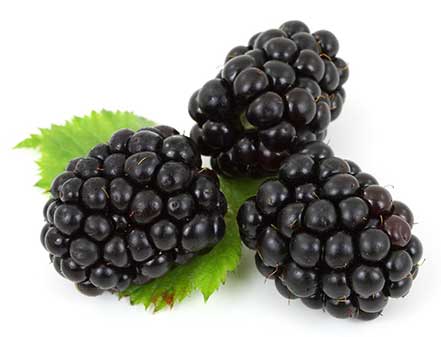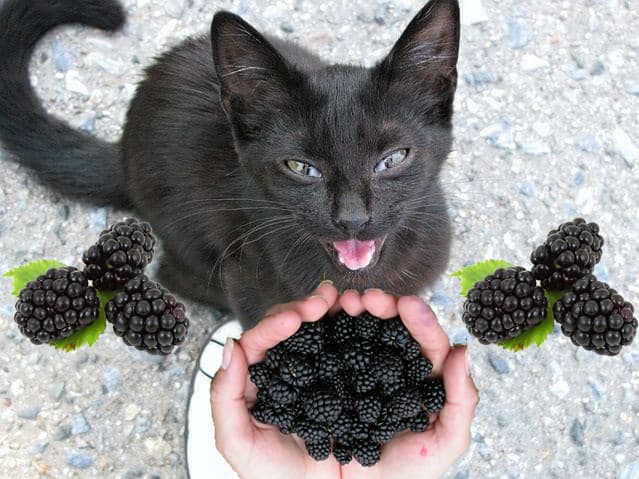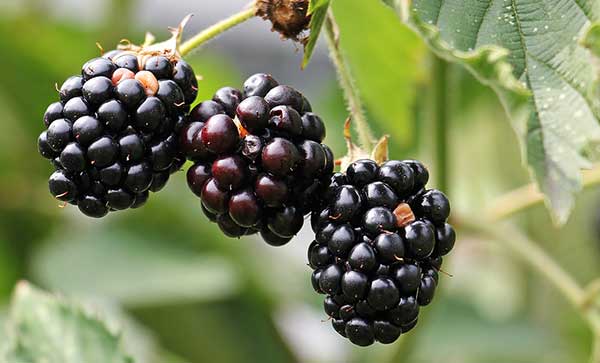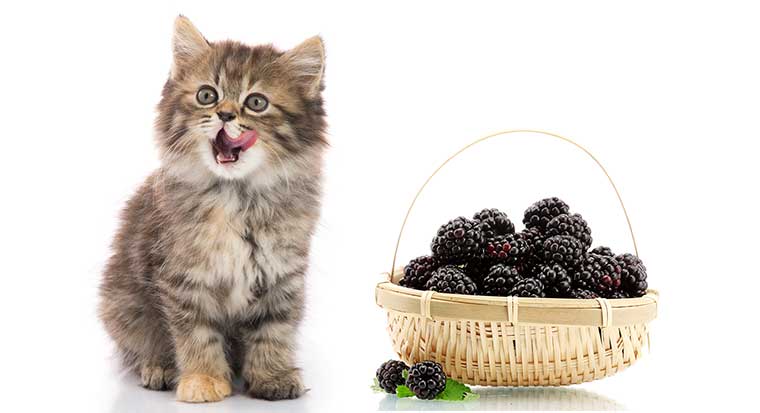Cats are essentially carnivores, but some of these felines are known to have a taste for vegetables and fruits as well. You can add blackberries to the list. Most human foods are not recommended to be fed to cats because it could lead to your cat ingesting something that could put its life at risk. When it comes to the question of blackberries, sure. You can feed your cat blackberries, but it is important to remember to give them in small quantities once in a while because too much of anything is bad for your cat.
Nutritional value

Blackberries have immense nutritional benefits. Some of the important nutrients include calcium, magnesium, potassium, and a lot of powerful antioxidants like anthocyanins. They are a rich source of Vitamin B, Vitamin A as well as Vitamins E and C. All of this put together, blackberries are known to increase brain activity, improve the digestive system and support overall oral health. Throughout the northern hemisphere, you will find blackberries. For many species of wildlife, blackberries are essential sources of food. They are low in calories and fat and can help maintain fitness (for you and your pet.) This fruit also contains large quantities of minerals such as potassium and iron, which improves the immune system. The earlier mentioned antioxidants present are also helpful in counteracting risks of cancer.
Blackberries for cats
Since blackberries are significantly low in calories and fat, adding them to your cat’s diet will help in maintaining the weight of your cat, keeping it lean. Cats and other pets, like humans, suffer calorie-related and weight-related medical issues like heart disease, hypertension and even diabetes. So, feeding your pet food with high calories is not a good idea. Blackberries fall under the category of fruits that you can feed your cat without worrying much about it developing the mentioned conditions.

Your cat’s immune system also gets a heavy boost thanks to blackberries. These fruits pack some essential vitamins such as Vitamin E, K, A, B, and C and highly important minerals like iron and potassium, all of which help in boosting your cat’s immunity. Blackberries reduce the susceptibility of cats to infections specific to their species. It gives them a remarkable and radiant coat. Not to mention, the antioxidants also help in preventing cancer in cats.
Blackberries are high in fiber. This will help in improving a cat’s digestive system and it relieves symptoms of indigestion like abdominal pains, bloating, constipation, etc. It regulates the cat’s bowl activity make it more regular. The high fiber content also reduces cholesterol levels and regulates blood sugar levels as well, making them feel full for much longer, all of which ties back to the weight loss or control benefits that this fruit gives.
How to introduce blackberries to your feline friend

As humans need a balanced diet, so do cats. Remember that cats do not naturally gravitate towards fruits, especially not ones that grow in the wild. Hence, if your cat rejects blackberries, this has to do with its feeding instincts that are not wired to eat some foods. If your cat has a natural liking to it, then it should be easier. However, both ways, it is not very hard to include blackberries in your pet cat’s diet. Because cats lead an elusive lifestyle (it is hard to pinpoint what they do where), they do find their way towards munching on vegetation once in a while. If a domesticated cat is already introduced to vegetables and fruits, it should be easy to include blackberries in the mix.
Potential risks to keep in mind
Cats must not be given blackberries far too often. Some studies have shown that this fruit can be potentially deadly if it is served to animals. But counter studies have pointed out that this is not the case, the risk is not about whether your cat ingests the blackberry but it is about the possibility of your cat choking on it or it getting lodged in the cat’s nasal passage. Still, there are reasons to be wary of this fruit. Cats are carnivores, there is no arguing that. Their diet has to primarily consist of meat. Blackberries with all their additional benefits must be included just as a treat. If your cat is not used to blackberries, then it might make digesting it less effective and your pet might face some difficulty.

As such, fruits have a chance of upsetting your cat’s stomach. Symptoms of indigestion and abdominal discomfort or pain could be caused due to this. If treatment is not provided, blackberry consumption could lead to vomiting and diarrhea in cats. Blackberries can be dangerous to ingest if they have been grown in conditions where the exposure to pesticides is extreme. They are naturally resilient fruit that is resistant to droughts and various plant diseases, so if it has been grown despite exposure to something like that, consuming blackberries of that nature can prove to be dangerous. The bottom line is, blackberries that go through conditions like that will contain plenty of chemical remnants. These chemicals, when ingested, might lead to chemical intoxication. If this goes unchecked, your cat could, unfortunately, develop cancer.
Finally, are blackberries poisonous to your cat?
You will have to take a few things into consideration before coming up with an answer to this. Giving your cat blackberries in small, moderate quantities does not pose any serious health issues to them. When the fruit is offered in large quantities, problems will arise. Especially, if it is given frequently. Cats may occasionally choose to munch over fruits and vegetables, but they will always remain to be carnivores. Anything, from blackberries to other fruits to anything foreign should be introduced and given to them in minute quantities. Keep a watchful eye and be vigilant about how your feline friend responds to the introduction or inclusion of blackberries in his or her diet. If your cat shows an aversion instantly, make sure you withdraw the fruit from its diet to avoid any mishaps.
